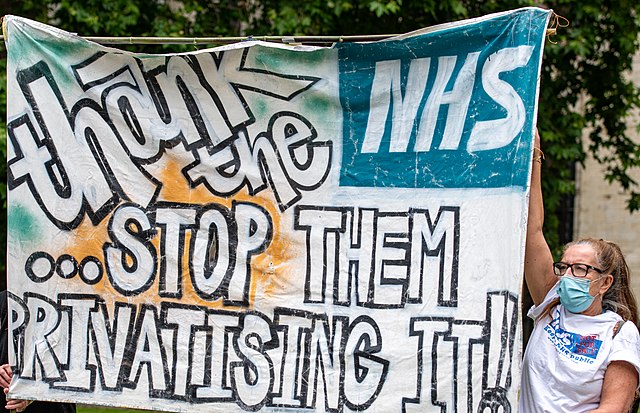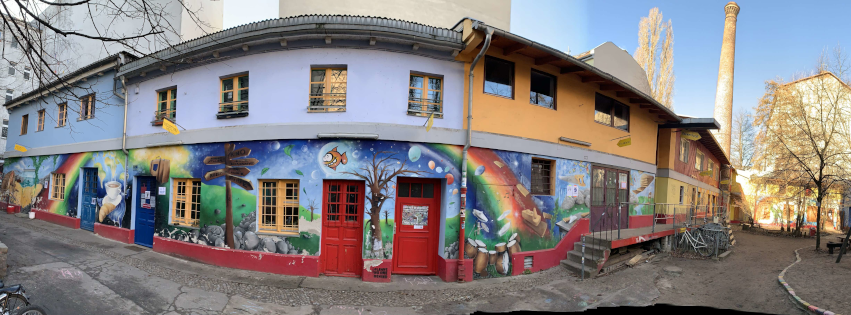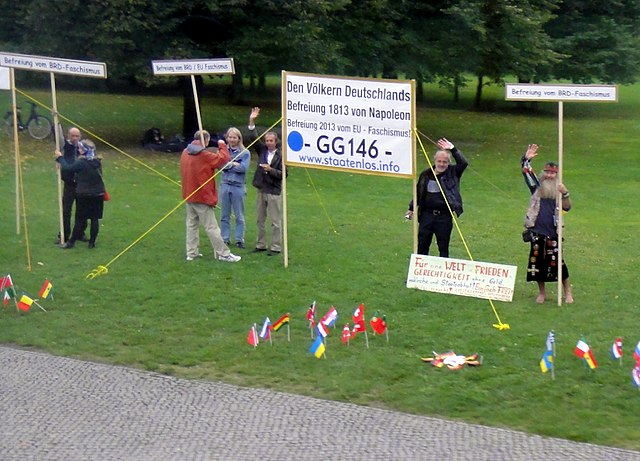The founding principles of the NHS have long been attacked. Now some politicians from both Conservative and Labour parties predict its impending collapse unless radically reformed. But they want to divert even more money to health care and insurance companies, and prop up a small, inefficient and often unsafe private sector, famously described by Julian Tudor Hart as ‘the red light district of the medical profession’. Saving the NHS requires acknowledging and reversing the catastrophic underfunding that has brought about its decline.
The recent report commissioned by the Department of Health and Social Care, embrassingly identified a “decade of neglect” by successive Conservative administrations as having weakened the NHS to the point that it cannot tackle the 7 million-strong backlog of care.
A publicly funded, provided and accountable NHS is the fairest and most efficient way of providing good health care. It is essential for a productive economy. The founding principles of the NHS are just as relevant today as in 1948. Those long ideologically opposed to this model, now argue it has failed and merits more privatisation. But the evidence for this is weak. In fact, a market in healthcare increases the likelihood of inequity and exploitation with suboptimal care for both rich and poor.
What is the real deal with the current crisis in the NHS?
Privatisation is not the answer to the NHS’s problems
Current dire problems in the NHS are directly linked to lack of workforce planning and chronic underfunding. The Health Foundation has estimated that spending on healthcare in the UK lagged behind comparable European countries to the tune of £40bn each year over the decade before the covid pandemic. Some US academics, keen to see a single payer system in their country, looked at recent pro-market developments in the NHS with a mixture of horror and incredulity, and put their finger on the motivation – ‘such reforms offer a covert means to redistribute wealth and income in favour of the affluent and powerful’.
Only a coherent long-term plan to build capacity in the NHS will solve the current crisis
The government published its elective care recovery plan for dealing with the pandemic backlog in February 2022. It was immediately criticised for lack of a workforce plan and addressing emergency care, both intimately connected to waiting lists. Neither were mental health nor general practice covered despite their considerable difficulties. In fact the plan was focused on long term reliance on the private sector although private providers during the pandemic showed themselves as very poor value for money. Block booking of 8000 private beds led to a 25% increase in NHS spending on commissioning while 27 private hospital companies delivered 43% less funded NHS healthcare than the year before the pandemic.
The ‘plan’ institutionalises NHS dependence on costly and inefficient private sector hospitals and beds, while recognising that the real problem is lack of adequate NHS capacity. Private hospitals make more money from self-paying patients than through NHS bills. This means the NHS is likely to pay over the odds, with such private providers who benefit from long NHS waiting lists and help themselves to NHS staff. The delivery plan anticipates that in the long term, the NHS will be confined to providing emergency services, medical care and more costly or complex treatments that the private sector has avoided.
‘Turbocharging’ – or throwing money at the private sector?
The government has set up an Elective Recovery Taskforce (‘Government turbocharges efforts to tackle Covid-19 backlogs)’ to help deliver its recovery targets. It again emphasises using the private sector. But the private sector is relatively small (around 8000 beds) and lacks capacity. While more patients who can afford it are turning to private hospitals, the same hospitals treat fewer patients under their private medical insurance. Because of the pandemic, fewer consultants work in the private sector and most who do so also work in the NHS. This means that if a surgeon, for example, does more work in one sector, he/she does less in the other.
Nineteen community diagnostic centres (CDC) have also been added to the 92 already established, supposedly to deliver more ‘life saving checks, tests and scans and speed up diagnoses for local patients. CDCs are supposed to separate urgent tests in hospital, from non-urgent investigations in a community setting. Whether they actually move care closer to home is controversial (many are located in hospitals). Hyped as ‘life saving’ they were first recommended in 2020. But the NHS Confederation pointed out ‘It is vital that we have a sustainable staffing model for these hubs, as well as any new service provision in the future, given critical constraints on the existing NHS workforce’. It is clear that the government has favoured headline-grabbing short-term funding for local partnerships with independent providers, rather than long-term investment in staffing and capital equipment for the public sector.
Chipping away at the NHS as a public service
With underfunding and understaffing led to horrendous NHS failings for all to see, the massive majority of the public still support its core principles. Pressure has come from right wing think tanks obscurely funded by foreign donors and given a platform by the BBC. Some prominent politicians use private health care services while other public servants undermine the NHS. For example, ex-Tory MP Sir David Prior, when chair of the Care Quality Commission, called for massive cuts in hospital bed numbers, and for hospitals to be taken over by US healthcare corporations.
Simon Stevens was appointed as chief executive of NHS England for seven years, after being a leading Blairite special advisor; an unapologetic proponent of competition in the health service; and working nine years at the top of an American health insurance company. Many argue he is as far removed from Aneurin Bevan as you can get.
Many proposals in Lansley’s Health and Social Care Bill were drawn up by McKinsey (the leading US Consultancy) and included in the 2012 legislation. The recent Health and Care Act signposted further fragmentation of the NHS, greater privatisation and damage to services and the workforce. Sunak has appointed Bill Morgan, a private healthcare lobbyist with links to controversial clients to advise him in Downing Street. Morgan was previously a special adviser to Lansley. Patricia Hewitt has been recruited by Jeremy Hunt to advise on health service reform. Yet as Labour Health Secretary in 2005 she set up ‘independent sector treatment centres’, brought in contracts with the private sector for pathology tests, scans and elective surgery, and pressed GP commissioners to outsource services. After allegations over political lobbying she was suspended from the Labour Party; Wes Streeting (the shadow Secretary of State for Health and Social Care) expressed delight at her recent appointment.
The All Party Parliamentary Group (APPG) on Health Care Infrastructure explores key challenges facing the buildings, technology and facilities supporting the NHS. It recently published its first report. They have no formal parliamentary status, but produce reports often endorsed by ministers, and they are commonly advised and even directly managed by private entities. This APPG is sponsored by four private firms with a financial interest in health infrastructure.
Business (as usual) is the All-party group solution for the NHS
The report notes huge problems from massive maintenance backlog, shortage of staff, and lack of funding for new equipment. It commented the NHS allocates only 7% of its total expenditure to capital compared with a European average of 10%. But rather than concluding more should be spent, it argues that meeting all health infrastructure needs through public funding is unviable. Third party development of community facilities is endorsed, citing the NHS LIFT 2001 programme for public private partnerships. Tellingly, there is no comment on the massive burden on the NHS represented by the Private Finance Initiative deals (https://lowdownnhs.info/private-providers/unhealthy-profits-pfi-in-the-nhs/)
In Scotland the question of a future two tier health service came out into the open.
Senior health officials said they were given the “green light” to discuss reforms by NHS Scotland chief executive Caroline Lamb. Leaked minutes, reveal proposals to design ‘a two-tier system’ where those who could afford to, go private. No doubt such discussions have also been going on in England. Reporting of this story highlights that journalists are good at listing the symptoms of the NHS in distress without ever questioning the underlying cause. The public would be served better if journalists started asking: “Why is the NHS in crisis? What is the truth behind the repeated assertion that the NHS is receiving record funding? Why can’t we afford the NHS?”
What does Labour say?
The Labour Party has remained relatively silent on the NHS believing that it is trusted by the population to “do the right thing”. A comprehensive motion was passed by delegates at this year’s party conference, including a position of outright opposition to, and commitment to vote against, any and all forms of privatisation. It is not binding on the executive and is likely to be ignored, just as was the 2017 conference motion calling for reversing all privatisation. Labour has made a welcome commitment to increasing staffing. But it has not given details of addressing underfunding, crises in mental health services, difficulty accessing urgent care, pressures on GPs and the ongoing toll of Covid 19. Labour’s ten-year plan for the NHS is deals only with generalities (importance of prevention, access to GPs, shifting resources from hospitals to social care and community). Such thinking has been ineffective because of lack of funding, lack of staff to deliver, and a failure to tackle the social determinants of health.
Wes Streeting, ,clarified Labour’s position recently. His comments ring alarm bells with NHS campaigners and the public. In a Guardian Opinion Piece, Streeting endorses use of the private sector, saying he does not want those who cannot afford to pay (‘working class people’) to be in pain while waiting for treatment. He also states that ‘Had a Labour government been in office this year, hundreds of thousands more patients would have been treated on the NHS in private hospitals’. Insisting that ‘We cannot continue pouring money into a 20th-century model of care, if we are to meet the challenges of the 21st century’. This sounds worryingly like blaming the Bevanite model of care for failure, not recognising it has been failed by politicians.
Claiming that the NHS must ‘reform or die’ is a readiness to depart from founding principles; while pointing out the NHS is ‘a service and not a shrine’ borrows directly from disparaging right wing rhetoric that the NHS is treated as a national religion. Unsurprisingly, these perspectives are coupled with reports of a desire to ‘take on the hostile unions holding back the NHS’. David Rowland (Centre for Health and the Public Interest) points out that private hospitals do not spend money on training staff but take them from the NHS; are difficult to hold to account when scandals over patient care arise (such as the rogue breast surgeon Ian Paterson); do not have intensive care facilities so transfer sick patients to the NHS; and provide poor medical cover, putting patients at risk. Moreover some companies involved were found liable over price fixing and healthcare fraud.
The logic that given its current difficulties the NHS must turn to the private sector suggests lack of any serious long-term vision as well as a blindness towards the parasitical nature of private care. The end result is to hasten the likelihood of a two tier service. A major reform of the for-profit sector is long overdue. In the meantime, what about the radical idea of simply requisitioning its beds at the present time to reduce further pain, suffering, and death? As did the Spanish government when Covid struck – (in contrast to the decision in England to rent 8000 beds at £300/day/bed. The UK situation now undoubtedly constitutes another grave emergency, with literally thousands of preventable deaths occurring each month.
In conclusion: What should we expect from opposition parties?
Opposition parties should explain clearly to the public that the crisis in the NHS is a consequence of government policy decisions. The failure to fund the NHS adequately over the last decade now makes it difficult for performance to recover. The public needs to understand why, in the face of ‘record funding’ (untrue) – waiting times remain poor and waiting lists grow. The increasing public money for contracts with the private sector instead of expanding the capacity of the NHS means drawing staff and funding away from the NHS, progressively weakening it. Cherry picking of patients by the private sector leads to greater inequalities, and increases the diversion of NHS budget away from health care. That money is channelled into pockets of shareholders, directors of private companies and as second salaries or fees to doctors practising privately.
Clear commitments to public provision are essential as is a willingness to improve pay and working conditions and to safeguard professional status. These are essential for staff morale, for safety and efficiency. The wider determinants of health must be addressed through redistribution of wealth and reducing economic inequalities. The NHS has been shrunk and cannot now meet the needs of an expanding population and increased demand for services. This, together with the unrealistic targets for “efficiencies” among NHS providers must be exposed.
Unambiguous commitment to adequate funding, the retention of taxation-based funding and expansion of NHS capacity to reduce waiting times is essential. A sense must be created that the opposition merits election to government on the grounds of vision, values, trustworthiness and ability to implement sound policy
An evidence-based analysis of new service configurations and funding mechanisms for health and care to maximise effectiveness and equity – must involve the public. Only this can build a consensus around a new vision fit for the pandemic era.
Although the NHS has been battered and fragmented and continues to be under relentless attack, there is still much left to defend. Currently around one fifth of the NHS budget flows to the private sector. That means four fifths is still spent on publicly provided services. Whereas the challenge to campaigners is huge, the conclusion by some that the NHS has already been downgraded to an American-style managed care system dominated by private health insurers is premature and only as a disincentive to fighting back. We will not give up the struggle.




